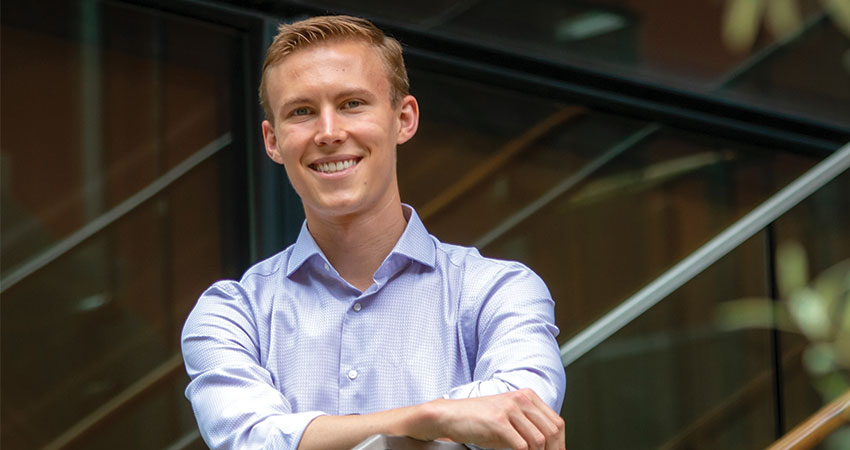
Kenan fellowships ignite career quest for cures
Most people can recall a turning point that defined their life path and set their career trajectory. Greg Poore’s turning point came in the summer of 2011, after his junior year of high school. Thanks to the generosity of the William R. Kenan, Jr. Charitable Trust—and his own hard work—Poore gained a coveted place interning in Glenn Micalizio’s chemistry laboratory at Scripps Research’s Florida campus. There, he devoted his summer to the design of new medications. The experience changed his life.
“The Kenan fellowship taught me the fundamentals of research and showed me how someone goes about asking good questions and designing effective experiments to find answers. It proved to me that research was something I wanted to do for the rest of my life,” Poore says.
Growing up in West Palm Beach, Florida, Poore had a talent for mathematics, but little familiarity with the world of scientific research—his family worked in real estate.
A gift to Scripps Research from the William R. Kenan, Jr. Charitable Trust opened that door. The Kenan family, one with historic ties to Florida’s development, had endowed science education programs at the bicoastal institute’s Florida campus beginning in 2005.
The trust’s namesake, William R. Kenan, Jr. was a talented chemical engineer. As an undergraduate, William R. Kenan, Jr.’s studies contributed to the discovery and identification of calcium carbide and the development of a process for making acetylene gas from it. In 1901, his sister, Mary Lily Kenan, married Henry Morrison Flagler, a founder of Standard Oil and developer of the Florida East Coast Railway and the Breakers Hotel of Palm Beach, among other ventures. Following Henry Flagler’s death in 1913 and Mary Lily Kenan Flagler’s death in 1917, a majority of the Flagler fortune was inherited by William R. Kenan, Jr. and his sisters. The family’s enduring commitment to science and education continues to touch lives for the betterment of all of society.
“I feel like I have 150 children. They are the future. They are going to cure so many of the ailments that exist now, I am convinced. They will have decades to contribute and really accomplish some things.”
—Tom Kenan
In 2012, thanks in part to his internship, Poore not only won admission to Duke University, he obtained financial aid that covered nearly all of his educational expenses. That was critical for his family amid South Florida’s severe real estate downturn. At Duke, Poore thrived. He was thrilled to meet a descendent of William R. Kenan, Jr., Thomas S. Kenan, III, of Chapel Hill, North Carolina, to thank him for the opportunity to learn at Scripps Research. They stayed in contact through the years.
“It’s something special when you meet someone who just wants to give, and is pleased when you do good work,” Poore says.
“It just blew me over that he wanted to come and say thank you. He is very, very special,” Tom Kenan says. Kenan keeps tabs on all of the Kenan Fellows at Scripps Research.
“I feel like I have 150 children. They are the future,” Tom Kenan says. “They are going to cure so many of the ailments that exist now, I am convinced. They will have decades to contribute and really accomplish some things.”
Poore completed a second Kenan fellowship at Scripps Research in Florida as an undergraduate, this time working in the lab of cancer immunologist Christoph Rader, PhD, on unique antibody-drug conjugates engineered to attack cancer and spare healthy tissue. Poore’s decision to dedicate his career to cancer research came through personal tragedy a few months prior, when his grandmother developed an aggressive form of pancreatic cancer; it was strengthened during that second Kenan fellowship.
“She went from being almost symptom-free, to passing within four weeks despite targeted chemotherapy,” Poore says.
“I wanted to understand what could be done to prevent others from going through the same experience. It became a calling.”
Today, Poore is pursuing joint MD/PhD degrees at the University of California, San Diego, and writing a thesis on the cancer microbiome.
“I am so thankful for all of the opportunities the Kenan fellowship has made possible,” Poore says. “My entire career trajectory has been shaped by it.”